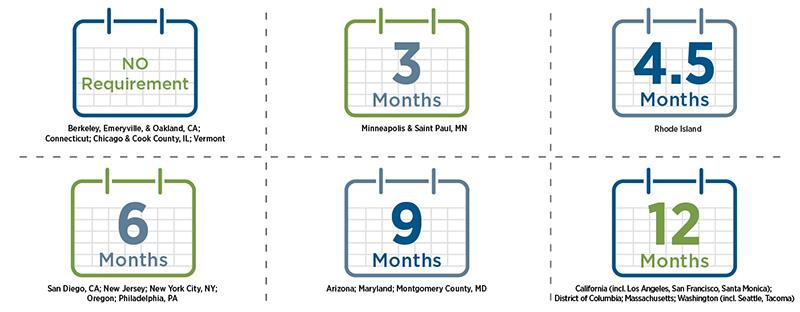Information contained in this publication is intended for informational purposes only and does not constitute legal advice or opinion, nor is it a substitute for the professional judgment of an attorney.
Many businesses will temporarily increase staffing levels for the upcoming holiday season, during which an uptick in colds and other illnesses is common. Employers may be concerned that seasonal workers will be absent on multiple occasions during their brief period of employment. Below we briefly highlight some issues for employers to consider when managing seasonal employees and paid sick and safe time (PSST).
Are Seasonal Workers Covered? Virtually all PSST laws include coverage for seasonal workers. However, depending on their length of service, seasonal workers may not meet a law’s covered employee threshold.1 California requires employees to work for 30 or more days (Los Angeles has a similar requirement), and in Vermont they must average no fewer than 18 hours per week. Chicago and Cook County, Illinois, Minneapolis and Saint Paul, Minnesota, and New York City, New York require employees to work at least 80 hours (in a year, except in Illinois where it is within a 120-day period).2 In Tacoma, Washington, employees must work more than 80 hours in a year. San Francisco, California requires employees to work for 56 or more hours, and Philadelphia, Pennsylvania requires working at least 40 hours in a year.3 In Montgomery County, Maryland, an employee must regularly work more than eight hours each week.
Waiting Periods: Employers may be able to institute a waiting period during which PSST cannot be used. Waiting period lengths vary by jurisdiction (see below4); 90 days is the most common, but lengthier waiting periods may be available generally or for seasonal employees. Whether and how long – practically speaking – a waiting period may be could depend on whether an employee is hired before or after a law takes effect, so before applying the lengthiest waiting period to an employee employers must familiarize themselves with a law’s specific requirements; particularly if former seasonal workers are rehired this year.

Reinstatement Obligations: Most, but not all, laws require that previously accrued but unused PSST be reinstated if employees are rehired within a specific timeframe (see below5). The reinstatement timeframe also varies by jurisdiction. Importantly, many laws are silent or unclear on whether employees that did not satisfy a waiting period during the initial period of employment must satisfy what would be the remainder thereof before using leave during the subsequent period of employment.6

See Footnotes
1 Although Duluth, MN’s PSST law does not take effect until January 1, 2020, it is worth noting that seasonal workers are not covered under the law.
2 Similar requirements exist in Austin & San Antonio, TX. However, the Austin law is currently enjoined during the pendency of an appeal, so it may not take effect as scheduled on October 1, 2018 and likely will be inapplicable this holiday season. The San Antonio law does not take effect until August 1, 2019, so it is inapplicable this holiday season.
3 It is debatable as to whether Philadelphia, PA’s PSST law even provides coverage for “seasonal workers” as it does not apply to a person hired for a temporary period of not more than 16 weeks during a calendar year. It also excludes an employee hired for a term of less than six months.
4 In Austin & San Antonio, TX, a 60-day waiting period can be imposed only if an employee’s term of employment is at least one year, which would not apply to seasonal workers. Neither is likely, nor will be, applicable this holiday season. In Connecticut, leave can be used upon completing the 680th hour of employment. In Michigan & Westchester County, NY, a 90-day waiting period can be imposed, but the laws are inapplicable this holiday season because they do not take effect until around April 1, 2019. Like Duluth (inapplicable this holiday season because it does not take effect until January 1, 2020) and Minneapolis, Saint Paul, MN (per the enforcement agency) allows use to be delayed until the 90th calendar day following commencement of employment. In New Jersey, when the state law takes effect on October 29, 2018, all 13 local laws will be preempted. Of those laws, 12 of the 13 permit a 90-day waiting period, whereas New Brunswick permits a 120-day waiting period. In Vermont, the waiting period may be applied to new employees only.
5 In the California cities without an obligation, a reinstatement requirement may exist under state law if one leave bank is used to comply with both laws. Moreover, under California state law (including the laws in Los Angeles, San Francisco & Santa Monica), and in the District of Columbia, the timeframe is one year. In Michigan & Westchester County, NY, reinstatement obligations arise if an employee is rehired within six months or nine months, respectively, but the laws are inapplicable this holiday season because they do not take effect until around April 2019. Under the state law in Maryland, reinstatement obligations arise if an employee is rehired within 37 weeks, and in Montgomery County the obligation arises unless the employee quit without good cause. In Minneapolis & St. Paul, MN, reinstatement obligations arise if an employee is rehired within 90 days (The same 90-day standard will apply in Duluth, MN when the law takes effect on January 1, 2020). When the New Jersey state law takes effect on October 29, 2018, it will preempt the existing 13 local laws, all of which contain a similar timeframe for reinstatement. In Oregon, reinstatement obligations arise if an employee is rehired within 180 days. In Rhode Island, reinstatement obligations arise if an employee is rehired within 135 days. In Austin & San Antonio, TX, reinstatement obligations arise if an employee is rehired within six months, but neither is currently applicable this holiday season and the Austin law may not survive a currently pending legal challenge.
6 The following jurisdictions are silent on the issue: Los Angeles & Santa Monica, CA; Maryland (including Montgomery County). The following jurisdictions use a “upon rehiring” standard: Arizona; California (including San Diego); Michigan; Duluth & Minneapolis, MN; Philadelphia, PA; Rhode Island; Austin & San Antonio, TX. The following jurisdictions expressly state a waiting period must be completed before leave can be used: San Francisco, CA; District of Columbia; Massachusetts (standard varies based on whether rehired within 4 months, or between 4-12 months, of separation); Saint Paul, MN; New Jersey; New York City, NY; Oregon; Washington (including Seattle & Tacoma). Note, however, that some of these laws are inapplicable this holiday season because they are not yet in effect – Michigan; Duluth, MN; Westchester County, NY; San Antonio, TX – or, in the case of Austin, TX, because the law is currently enjoined during an appeal.


